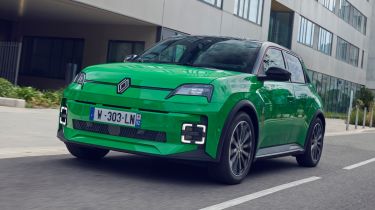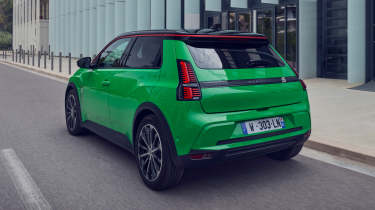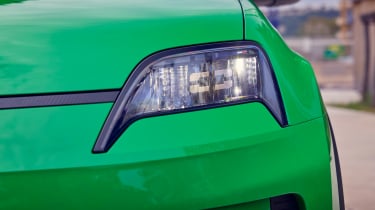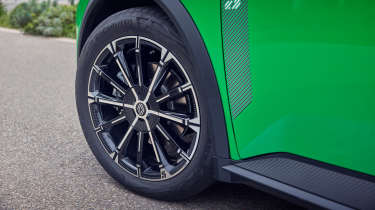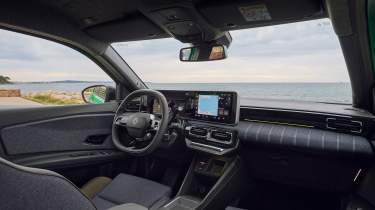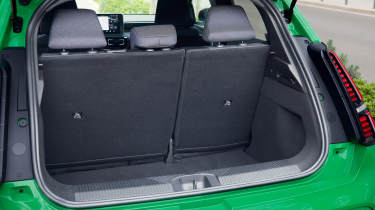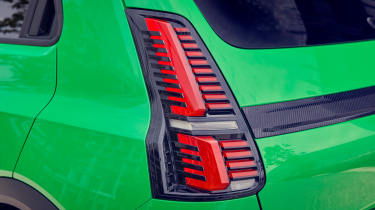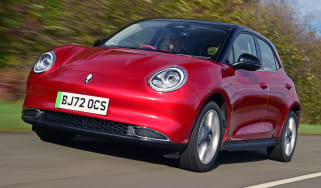Renault 5 review
Renault’s retro supermini is a stylish EV with plenty of substance
Pros
- Distinctive styling
- Affordable
- Comfortable
Cons
- Not the most practical
- Less fun to drive than we’d like
- Some irritating switchgear
| Range | Wallbox charge time | Rapid charge time |
| 186-249 miles | 5hrs 30 mins - 7hrs (7.4kW) | 30mins (15-80%, 80-100kW) |
Following plenty of anticipation, the Renault 5 has been reborn as a fully-electric supermini. It would appear that this retro reincarnation was worth the wait, too, as it offers plenty of likeable qualities to match its stylish looks.
Of course, this isn’t the only classic car-inspired small electric car on today’s market. The MINI Cooper E and Fiat 500e are already well established as competitors for the Renault 5, and the car’s own Renault 4 sibling will also be battling for its share of sales.
In order to attract buyers who shop with their heads as well as their hearts, the 5 comes with a 52kWh battery pack that returns up to 249 miles of range on the WLTP combined cycle. A smaller 40kWh unit will also be added to the line-up at a later date. The starting price for this fully electric Renault is appealing, too, with the entry-level 40kWh model kicking things off from £23,000.
Performance enthusiasts may be disappointed to hear that neither of the single-motor powertrains is massively powerful. However, those who were hoping for an electric interpretation of the classic Renault 5 GT Turbo will be better suited by the Alpine A290.
That being said, the Renault 5 still offers a reasonable 118bhp when fitted with the 40kWh battery, while the larger 52kWh model bumps this figure up to 148bhp. This added power allows the 5 to cover the 0-62mph dash in exactly eight seconds. Both variants are limited to a 93mph top speed.
Although it’s quite a low-priced car by current EV standards, the Renault 5 offers a plentiful amount of technology and decent interior quality. Twin 10-inch screens dominate the dashboard, while a smattering of bright and contrasting colours help make the cabin a bright and pleasant place to be. Passenger space is a little tight in the back seats, but there’s a decent amount of storage along with a 277-litre boot.
Renault is yet to confirm trim levels for the UK market, but for those who can’t resist the charms of the 5 a moment longer, the brand is offering an ‘R5 R Pass’ for £150 in order to get fast-tracked into the order books.
Range, battery size & charging
| Model | Range | Wallbox charge time | Rapid charge time |
| 5 40kWh | 186 miles (est) | 5hrs 30mins (7.4kW) | 30min (15-80%, 80kW) |
| 5 52kWh | 249 miles | 7hrs (7.4kW) | 30min (15-80%, 100kW) |
Our Renault 5 test car was powered by the larger 52kWh battery pack, and we were able to achieve an average real-world efficiency figure of around five miles per kWh. This means the brand’s claimed WLTP combined range of 249 miles was just about within reach.
We expect the smaller 40kWh to come with an official range of around 186 miles, but we’re yet to see if this can be achieved on the road. As always, colder weather may have a negative impact on the Renault’s efficiency, but every car comes with a heat pump as standard in order to mitigate this issue.
DC rapid charging speeds depend on the chosen battery — 80kW for the 40kWh pack and 100kW for the 52kWh — but both can be topped up from 15% to 80% in around 30 minutes.
A full charge at home from a 7.4kW home wallbox charger will take around five-and-a-half hours for the smaller 40kWh unit, increasing to seven hours for the larger battery. In other words, it’ll probably be an overnight job.
Running costs & insurance
As electric car prices start to gradually drop, the Renault 5 certainly has an attractive starting figure of just £23,000. In fact, even the top-spec model comes in at under £30,000. It wouldn’t be too surprising to see some very tempting finance and leasing deals in future, either.
The 5’s official insurance groups are yet to be confirmed, but for reference, the MINI Cooper E sits in groups 20 to 26. VED road tax sits at zero for the time being (although this will change in April 2025) but all Renault 5s cost less than £40,000, so there’s no luxury car tax to worry about.
Anyone considering the Renault 5 as a company car is able to take advantage of the usual 2% Benefit-in-Kind tax rate that applies to all EVs at present. However, this will soon start to climb towards 5% by the 2027/2028 tax year.
Performance, motor & drive
| Model | 0-62mph | Top speed | Driven Wheels | Power |
| 5 40kWh | TBC | 93mph | Front | 118bhp |
| 5 52kWh | 8.0 seconds | 93mph | Front | 148bhp |
Neither variant of the Renault 5 can really be described as a hot hatch (this role is being fulfilled by the closely related Alpine A290), but both cars still provide more than adequate power for those in the market for a sensible electric supermini.
The less powerful 40kWh car produces 118bhp from its front-mounted motor, although we’re yet to test this model. Our 52kWh test car, though, bumps up the power to 148bhp and this, along with 280Nm of torque, results in a 0-62mph time of 8.0 seconds. Both cars have a limited top speed of 93mph in order to preserve efficiency.
It’s not just these run-of-the-mill performance figures that prevent the Renault 5 from being genuinely fun to drive, either, as it feels as though the focus has been placed more on comfort than excitement. While the 5 felt composed enough in the corners during testing, the wheels did struggle with traction when we planted the right pedal from a standstill.
Take things a bit easier, though, and the precise steering, tight turning circle and decent all-round visibility make the 5 a pleasantly easy car to drive. Cruising at motorway speeds is a calm and peaceful experience, too.
Interior, dashboard & infotainment
In order to back up its funky appearance, the Renault 5 also features a rather colourful cabin. While this is cosmetically pleasing for the most part, there are also a number of useful features thrown in as standard.
The dashboard is dominated by two 10-inch screens running Renault’s Google-powered software. We’ve previously been highly impressed by the system used in the Renault Megane E-Tech, and this brilliance has been carried over to the 5. The screens are both easy to read, while the infotainment system is straightforward to navigate and highly responsive to the touch.
This class-leading system is accompanied by some pleasant materials, but there are still some lower-quality, cost-saving plastics to be found if you search hard enough. Mostly, it feels well put together, though.
Unlike Tesla’s minimalist approach, Renault hasn’t been shy when it comes to buttons and stalks. In fact, there are four stalks on the steering column, and we found these a bit cumbersome at times during testing. There’s a set of proper buttons located under the central screen, and these operate systems such as the air-conditioning. A physical stereo volume can be found, too.
Another area that we found ergonomically challenging was the Renault’s gear selector. This is one of the four stalks, and it requires a notable amount of force in order to engage drive, neutral or reverse. This makes three-point turns particularly troublesome, and there’s no obvious park mode, either.
Boot space, seating & practicality
The Renault 5 is a small electric car, and passengers in the back seats will be particularly aware of its dimensions.
Space for the rear occupants has been sacrificed in order to accommodate the reasonably-sized 277-litre boot. The result is a noticeably tight amount of legroom, so taller passengers may be reluctant to take on longer journeys.
Front passengers fare slightly better, and the adjustable seats help to maximise the space on offer. The Renault’s small windscreen and high dashboard mean the overall cabin feels a bit confined, though.
Reliability & safety rating
The Renault 5 is yet to undergo Euro NCAP safety testing, but the French brand’s more recent EVs have a good track record so far. Both the Megane E-Tech and Scenic E-Tech have achieved a full five-star rating, so we’d assume that Renault is keen to continue this streak.
Active safety features such as lane-keeping assist, autonomous emergency braking and road sign recognition are fitted as standard. For those who aren’t too keen on this tech, Renault has also included a ‘personal’ setting, so drivers can deactivate systems to meet their personal preferences. Once the settings have been selected in a sub-menu, this mode can then be activated by double-pressing a small button.
It’s also too early to tell how reliable the Renault 5 will be, but EVs have fewer moving parts so the probability of a major fault is lower. For peace of mind, the standard warranty covers the Renault 5 for five years or 100,000 miles (whichever comes first).

